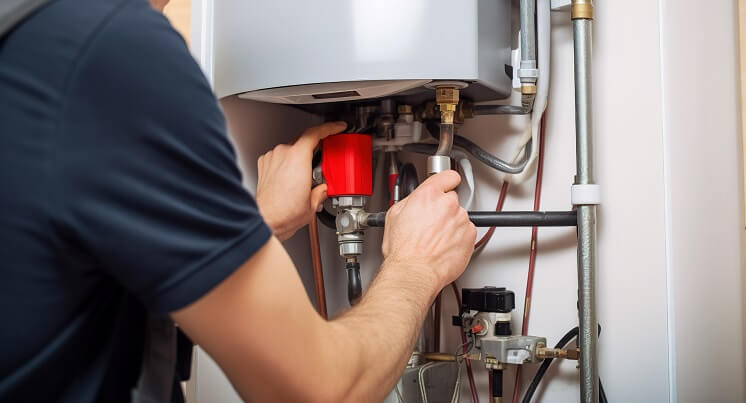What To Do For Common Water Heater Malfunctions
What To Do For Common Water Heater Malfunctions
Blog Article
We've encountered this great article pertaining to Water Heater Repair and Troubleshooting directly below on the internet and think it made good sense to share it with you on this site.

Think of starting your day without your regular hot shower. That already establishes a bad tone for the remainder of your day.
Every home requires a trustworthy hot water heater, but just a few know exactly how to take care of one. One very easy method to maintain your hot water heater in top form is to look for mistakes routinely and repair them as quickly as they show up.
Keep in mind to shut off your hot water heater before smelling around for faults. These are the hot water heater faults you are most likely to run into.
Water too warm or too cool
Every water heater has a thermostat that identifies how warm the water obtains. If the water coming into your home is also hot in spite of establishing a convenient maximum temperature level, your thermostat may be faulty.
On the other hand, too cold water might result from a fallen short thermostat, a broken circuit, or improper gas circulation. For instance, if you use a gas water heater with a busted pilot light, you would certainly get cold water, even if the thermostat remains in ideal problem. For electric heating units, a blown fuse might be the offender.
Insufficient hot water
Hot water heater come in numerous dimensions, relying on your hot water needs. If you run out of warm water before everybody has had a bath, your water heater is too small for your family size. You should consider mounting a bigger hot water heater storage tank or going with a tankless water heater, which occupies much less area and is more long lasting.
Unusual noises
There go to least 5 type of noises you can speak with a water heater, however the most usual interpretation is that it's time for the hot water heater to retire.
To start with, you need to be familiar with the normal appears a water heater makes. An electrical heater might appear various from a gas-powered one.
Standing out or banging audios normally mean there is a piece of debris in your storage tanks, as well as it's time to clean it out. On the other hand, whistling or hissing noises may just be your valves allowing some pressure off.
Water leakages
Leakages might originate from pipes, water links, shutoffs, or in the worst-case circumstance, the tank itself. Gradually, water will certainly rust the storage tank, and also discover its escape. If this takes place, you need to change your hot water heater immediately.
Nevertheless, before your adjustment your entire tank, be sure that all pipelines remain in location which each valve functions completely. If you still require help determining a leakage, call your plumber.
Rust-colored water
Rust-colored water suggests one of your hot water heater elements is rusted. It could be the anode pole, or the storage tank itself. Your plumber will be able to identify which it is.
Warm water
Despite exactly how high you set the thermostat, you won't obtain any warm water out of a heating system well past its prime. A hot water heater's performance might minimize with time.
You will likewise obtain warm water if your pipes have a cross link. This means that when you activate a faucet, warm water from the heating unit streams in along with regular, cold water. A cross connection is easy to place. If your warm water taps still pursue closing the hot water heater shutoffs, you have a cross connection.
Discoloured Water
Rust is a significant cause of unclean or discoloured water. Corrosion within the water storage tank or a falling short anode rod might cause this discolouration. The anode rod safeguards the tank from rusting on the inside and should be inspected yearly. Without a rod or a properly operating anode pole, the hot water quickly wears away inside the container. Call a specialist water heater technician to establish if replacing the anode rod will certainly fix the trouble; otherwise, change your hot water heater.
Conclusion
Ideally, your hot water heater can last 10 years before you need a modification. Nonetheless, after the 10-year mark, you might experience any one of these mistakes more regularly. At this point, you should add a new water heater to your spending plan.
How To Troubleshoot 3 Common Water Heater Problems in Twin Cities
The Water Heater Is Leaking
A leaky cold water inlet valve A loose pipe fitting A leaky temperature and pressure relief valve A corroded anode rod A cracked tank Turn Off Your Water Heater:
Shut off your gas water heater by turning the gas valve on the unit to the “OFF” position. Shut off your electric water by switching its power off at your electrical panel. Look for a two-pole breaker labeled “water heater” and turn it to the “OFF” position. Move the ball valve connected to the water heater to be perpendicular to the piping at a 90° angle. Look for the Leak:
Depending on whether the water is coming from the tank's top or bottom, you’ll want to look for the leak in different locations.
If the leak comes from the top of the tank, carefully look for water escaping from the cold water inlet valve or loose pipe fittings. Rusted hot and cold water valves can have loose connections with the tank, with water leaking out of them.
https://mspplumbingheatingair.com/blog/how-to-troubleshoot-3-common-water-heater-problems
As a devoted reader about Common Problems with Your Home Water Heater, I think sharing that article post was a great idea. Do you know about another person who is interested by the niche? Feel free to promote it. We take joy in reading our article about Water Heater Repair and Troubleshooting.
Immediate plumbing assistance for emergencies. Report this page